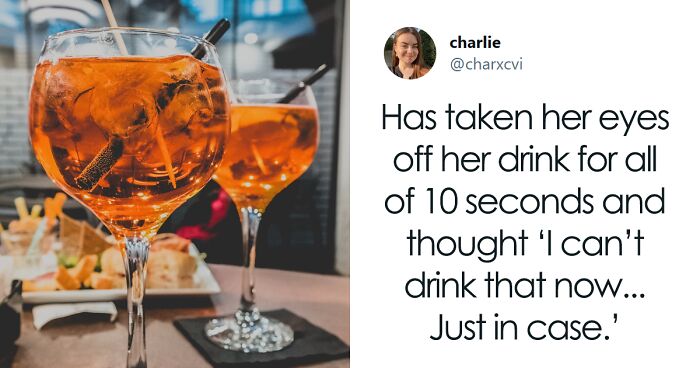
Women Post What’s On Their Mental Checklist To Feel Safe, And It’s Horrific That All Women Relate To It
Sarah Everard’s disappearance on March 3 has put the discussion about sexual harassment, assault, and kidnapping in the spotlight in the UK. Women have been coming forward and sharing their experiences with being harassed. Meanwhile, others have been sharing the concerns they have for their safety every day. Below you will find some of the mental checklists that women run through to stay safe, as well as their stories about what it’s like to constantly live in fear. This particular discussion was started up by left-wing activist and human rights barrister Harriet Johnson on Twitter.
33-year-old marketing executive Sarah was last seen in Clapham, in south London. Since then, a senior London Metropolitan Police officer has been arrested in a house in Kent while human remains have been found in a wooded area in the city. It has just been confirmed that the remains are those of the missing woman.
Plan International UK explained to Bored Panda that self-defense lessons may help women feel safer and more empowered. However, defense tools like mace and pepper spray are illegal in the UK. If you feel threatened or if you are in immediate danger, call 999 in the UK.
Meanwhile, Jorge Arteaga, the Deputy Director at ‘Hollaback!’ told Bored Panda that women should be able to walk safely without fear of being harmed or harassed because of who they are or how they identify. “I think Covid restrictions have possibly created some unsafe situations. A personal example I can share is here in NYC where I live. The subway system ridership drop to below 50% usage over the pandemic because less people are in the city, or are afraid to take public transportation, and one of the restrictions placed stopped train service from 1- 5 AM and reduced schedules. This led to unsafe conditions in the subway system.”
After Sarah Everard’s disappearance, women have been sharing what they do to stay safe on the streets
Image credits: Andrea Piacquadio
Image credits: HarrietEJohnson
A representative of Plan International UK gave victims of public sexual harassment some advice to keep in mind that may be helpful: “You are not to blame for the harassment you experience. Only the harasser is to blame, and only their behavior should change. Trust your instincts, if something feels not right then it probably isn’t. You are not alone. Unfortunately, half of the girls in the UK experienced public sexual harassment this summer. This means there are lots of people and places you can reach out to for support and solidarity.”
Image credits: lizzielove
Image credits: JoyPersaud
Image credits: ZH956
Image credits: goode_kimberley
Image credits: KATIEDOLL1201
Image credits: HeatherBowring
Image credits: stephjbradbeer
Image credits: Tori_FFC
Image credits: emariehanson
Image credits: janeyalexk
Image credits: charxcvi
Image credits: nakedvix
Image credits: TracyEdwardsMBE
Every instance of public sexual harassment is different, therefore, unfortunately, the only piece of advice that Plan International UK can give everyone is to try to leave the situation safely. “This is because it depends on many factors including how serious or unsafe the incident is, how the individual girl feels, and where it is happening—we would not want to suggest any action that could further escalate the situation. However, if you feel threatened in the moment or you are in immediate danger, call 999.”
What’s more, you can report the event to the police, and here are some steps that you can take that will help later on. “Make Notes. Always write down the time, location, and a description of what has happened as soon as you feel able to do so. Send it by email to yourself or take a photograph of any notes so there is a time-stamping. You may be able to refer to contemporaneous notes later if necessary to help remind you of critical details you noticed when it was fresh in your mind. Try to be as factual as you can: this happened, then that happened, and these were the details, and this is how I felt.”
If you’re a victim of public sexual harassment, you should also tell someone you trust about this. “That might be critical supportive evidence later. You can also write to local councilors or your MP about the incident. If it is carried out by an identifiable employee, you could also write to their employer asking for measures to be taken,” Plan International UK said.
“Seek support and comfort. Do not suffer alone in silence. Experience of other forms of abuse shows that one of the most frightening things is to carry the burden of what has happened on your own. Part of the damaging effects of abusive behavior is that it can be isolating and create an unwarranted sense of shame in you. There are various ways to find support. If you’ve experienced public sexual harassment and need to talk to someone, you can call Childline on 0800 1111 or visit their website.”
Plan International UK explained that not all forms of public sexual harassment are currently illegal. “Girls have told us that they’ve been turned away by the police when they have tried to report it. This is why we are running the #CrimeNotCompliment campaign to call for new, clearer legislation to make public sexual harassment a specific criminal offense. We would encourage all to join the campaign here.” Plan International UK has partnered up in the campaign together with Our Streets Now.
Some women have also shared their own experiences being harassed and assaulted
Image credits: hansmollman
Image credits: caitlinmoran
Image credits: georgiacobrien
Image credits: georgiacobrien
Image credits: KateFlood
Image credits: BeeBabs
Image credits: HelloTerriLowe
Image credits: Wade73605662
Image credits: cix_stormrage
Image credits: PSBFAN1991
Image credits: escaped_ferret
Image credits: MatroidGirl
Image credits: LillianO_RN
Image credits: DenyseWhillier
Image credits: ErraTheIceQueen
Image credits: hariandpat
Image credits: Tam5
Image credits: Rosiecat2
Image credits: BethRell
“Sarah’s disappearance in these awful and wicked circumstances is every family’s worst nightmare,” the Commissioner of the Metropolitan Police, Cressida Dick, said.
Dick explained that it’s still “incredibly rare” for a woman to be abducted in the streets of London. However, she pointed out that she understands that many women are afraid for their safety after recent events. “I completely understand that despite this, women in London and the wider public—particularly those in the area where Sarah went missing—will be worried and may well be feeling scared.”
Sarah was spotted on doorbell video footage at around 9:30 p.m. on March 3, walking home from a friend’s house. Her family became worried and raised the alarm after she’d not been in contact with her friends since then.
On March 9, police arrested a member of the Parliamentary and Diplomatic Protection Command who is in his 40s.
“Reclaim These Streets” is organizing a series of vigils all over the UK to highlight women’s safety. However, the police have pointed out that due to Covid restrictions, it’s illegal to do so in London at the moment. The organizers of the vigils plan to take this to the High Court.
“Remember that it’s not your fault”
In a previous interview, Bored Panda spoke about street harassment with Emily May, the Co-Founder and Executive Director at ‘Hollaback!’
“Street harassment is sexual, gender-based, and bias-motivated harassment that takes place in public spaces like the street, the supermarket, and the social media we use every day. At its core is a power dynamic that constantly reminds historically subordinated groups of our vulnerability to assault in public spaces. Street harassment can happen to anyone, but disproportionately punishes women, girls, LGBTQ+ people, and other marginalized groups for being themselves in the world,” May said.
“Street harassment is on a spectrum of gender-based violence. At one end of the spectrum, we have examples like inappropriate gestures, staring, whistling, following, and comments about your appearance or identity,” May told Bored Panda.
“As we move along the spectrum we start to see more severe forms of street harassment like public exposure and groping that are illegal. We include these behaviors in how we define street harassment because they are so common, pervasive, and rarely reported to authorities.”
Street harassment, according to May, is at its core all about power dynamics. “If street harassment were about getting dates, it would be what author Marty Langelan calls a ‘spectacularly unsuccessful strategy.’ Instead, street harassment is about ‘putting people in their place.’ Remember that it’s not your fault. And because it’s not your fault, it’s also not your responsibility to have the perfect response to street harassment. It’s their responsibility not to harass you.”
May highlighted to Bored Panda that everyone is vulnerable to street harassment to some extent. However, research shows that those who are aware of their surroundings, walk confidently, and respond to harassment with confidence are less vulnerable than others.
“Nevertheless, direct confrontations with people who harass can escalate, particularly if you are alone or in an unpopulated space. While it is each individual’s right to decide when, how, and whether to respond to street harassment, it’s important to prioritize your safety and wellbeing,” May said.
‘Hollaback!’ Co-Founder May said that when you find you’re harassed on the street, the first thing that you should do is trust your instincts. You and you alone should decide how you react. If you feel safe, you can try documenting the situation; however, your safety is your priority.
108Kviews
Share on FacebookWomen really do these things... please don't belittle their experiences just because you yourself haven't had to do it. If you haven't then you are lucky. I grew up in places people would consider "safe" yet I was taught these things; it can and does happen everywhere. I have a friend who was sexually assaulted in a car park in daylight. She screamed and was rescued by a man who heard her screams, who then chased down her attacker. He was caught and jailed. The thing that she struggled with was that she felt she had done everything right; she parked in a busy, well lit car park, she had her keys in her hand, she had left before it got dark... she felt she had to tell people this in case they suggested that she was in some way U.K. blame. Victim shaming is very real which is just appalling.
Yes, women do all of these things in order to feel safe and that should not be belittled. Every evening when I enter my apartment, I check every room in my apartment and then text my sister that I made it in safely. This is one of the things that make us both feel more secure in our homes.
Load More Replies...It strikes me sometimes when I go out at night -- to run to the store to get something -- how completely safe I am. As a white man the worst I could ever expect is to be mugged and at 52 that has never happened. I've lived in Toronto and Montreal and spent several months in Berlin and I have never felt unsafe at night by myself. And it's easy to be complacent in my privilege. I'm white so I don't fear the police and I'm a man so I don't fear men. But I have realized when I freely run to the store at 1am to get milk, and doing so without a second thought, that my friends who are women, or black, or trans, cannot do that. They would have to wait until daylight. Once I understood this I finally understood privilege. I know some reading this will accuse me of virtue signally, or white knighting, or being woke, as if having empathy was a bad thing. But once you understand privilege you realize it's not about being ashamed to be a white man or to apologize but to listen and to act.
Teaching how to stay safe is all good but can we also teach men to not put women in danger in the first place?
Women really do these things... please don't belittle their experiences just because you yourself haven't had to do it. If you haven't then you are lucky. I grew up in places people would consider "safe" yet I was taught these things; it can and does happen everywhere. I have a friend who was sexually assaulted in a car park in daylight. She screamed and was rescued by a man who heard her screams, who then chased down her attacker. He was caught and jailed. The thing that she struggled with was that she felt she had done everything right; she parked in a busy, well lit car park, she had her keys in her hand, she had left before it got dark... she felt she had to tell people this in case they suggested that she was in some way U.K. blame. Victim shaming is very real which is just appalling.
Yes, women do all of these things in order to feel safe and that should not be belittled. Every evening when I enter my apartment, I check every room in my apartment and then text my sister that I made it in safely. This is one of the things that make us both feel more secure in our homes.
Load More Replies...It strikes me sometimes when I go out at night -- to run to the store to get something -- how completely safe I am. As a white man the worst I could ever expect is to be mugged and at 52 that has never happened. I've lived in Toronto and Montreal and spent several months in Berlin and I have never felt unsafe at night by myself. And it's easy to be complacent in my privilege. I'm white so I don't fear the police and I'm a man so I don't fear men. But I have realized when I freely run to the store at 1am to get milk, and doing so without a second thought, that my friends who are women, or black, or trans, cannot do that. They would have to wait until daylight. Once I understood this I finally understood privilege. I know some reading this will accuse me of virtue signally, or white knighting, or being woke, as if having empathy was a bad thing. But once you understand privilege you realize it's not about being ashamed to be a white man or to apologize but to listen and to act.
Teaching how to stay safe is all good but can we also teach men to not put women in danger in the first place?

 Dark Mode
Dark Mode 

 No fees, cancel anytime
No fees, cancel anytime 






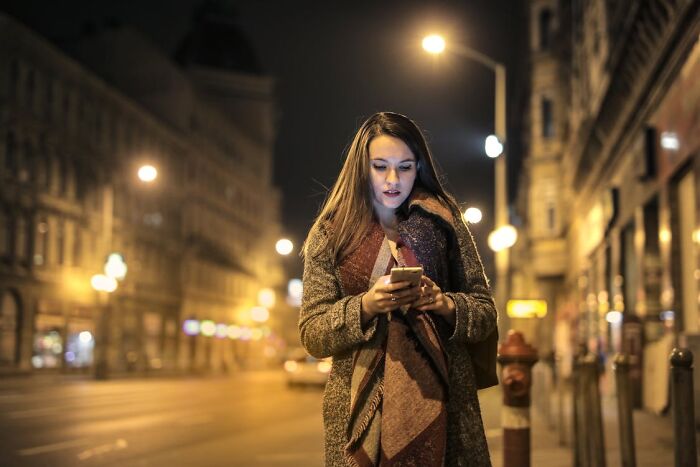
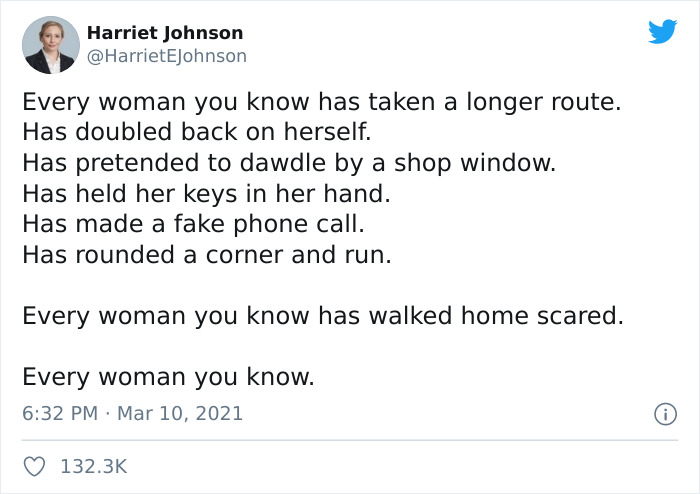
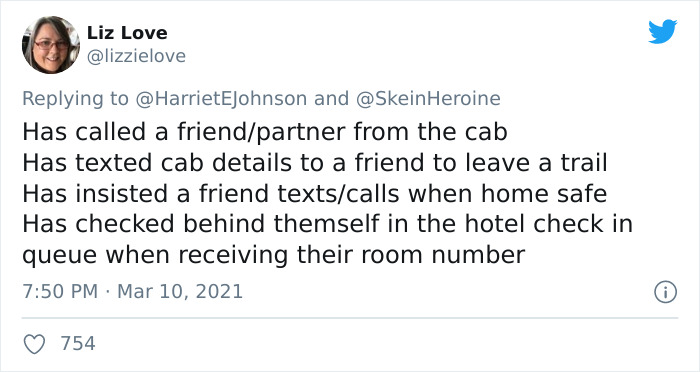
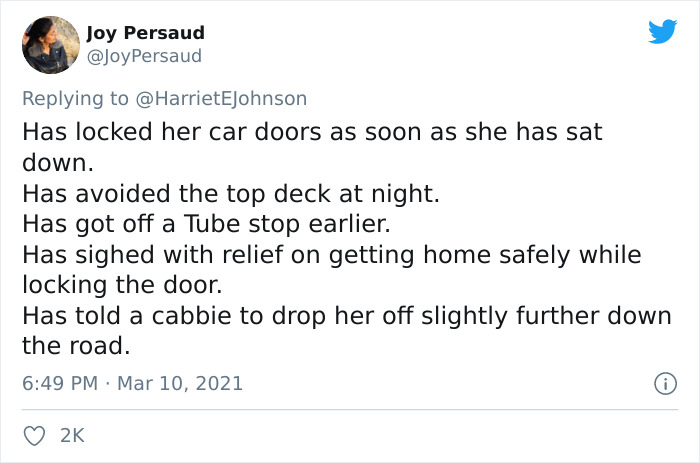
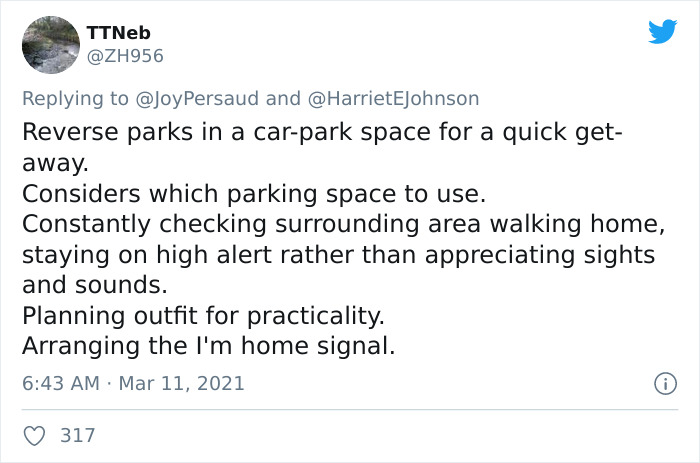
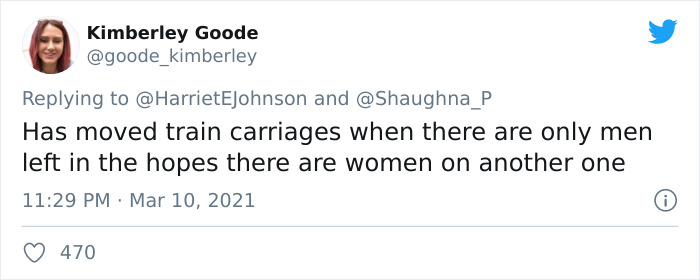
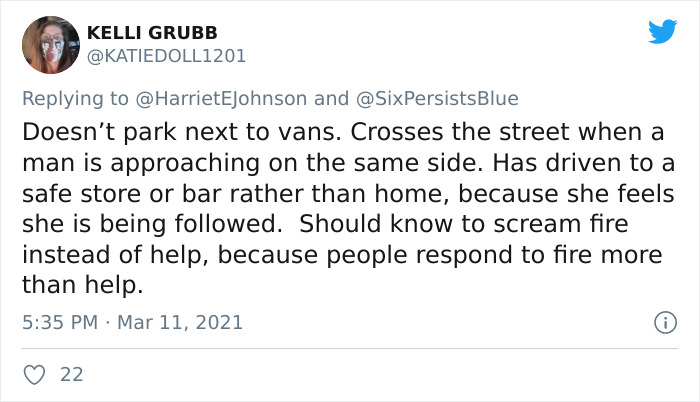
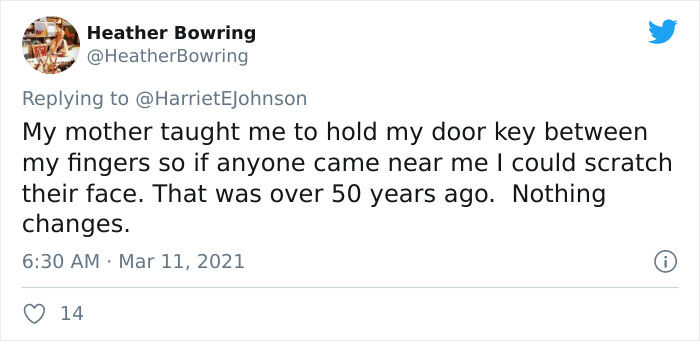
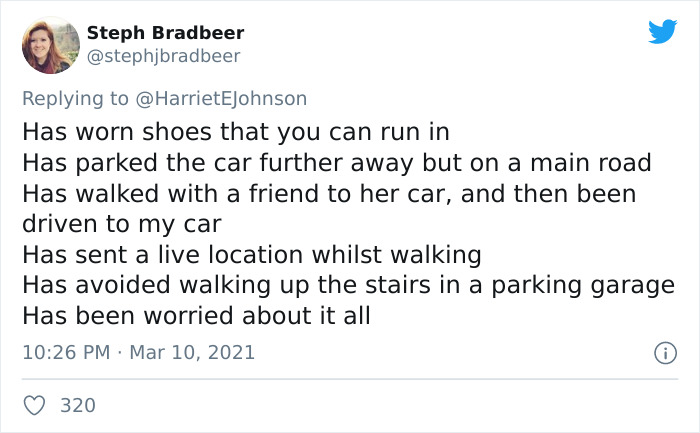
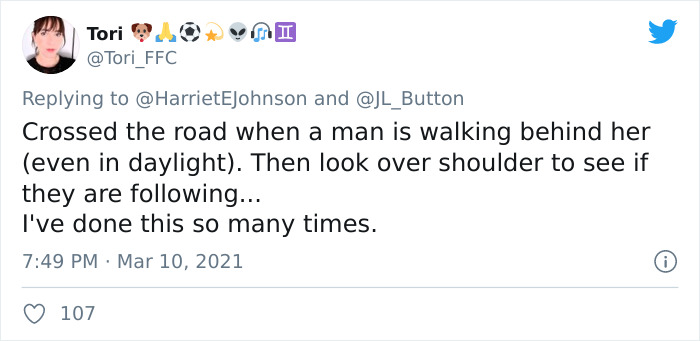
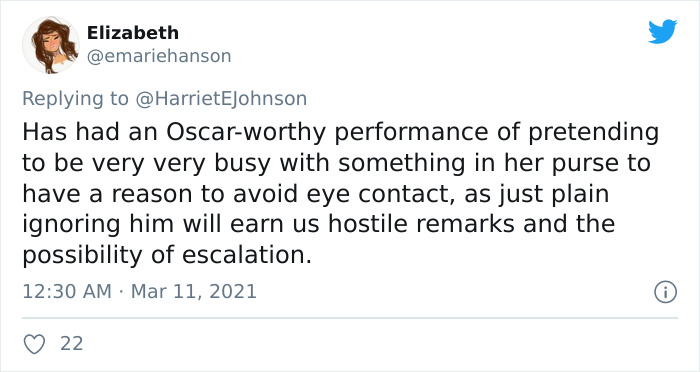
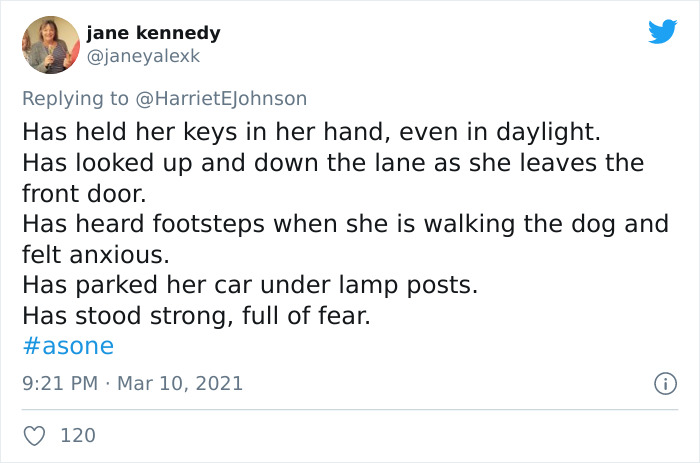
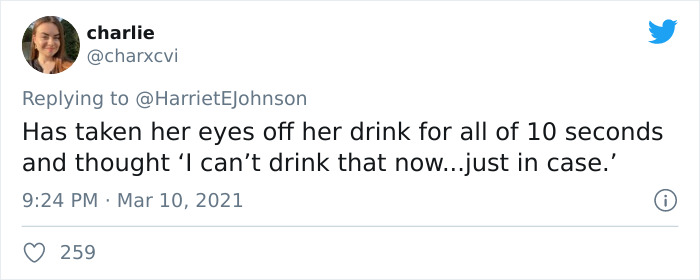
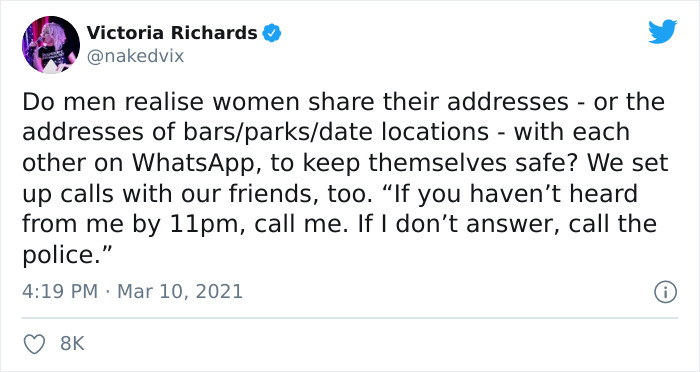
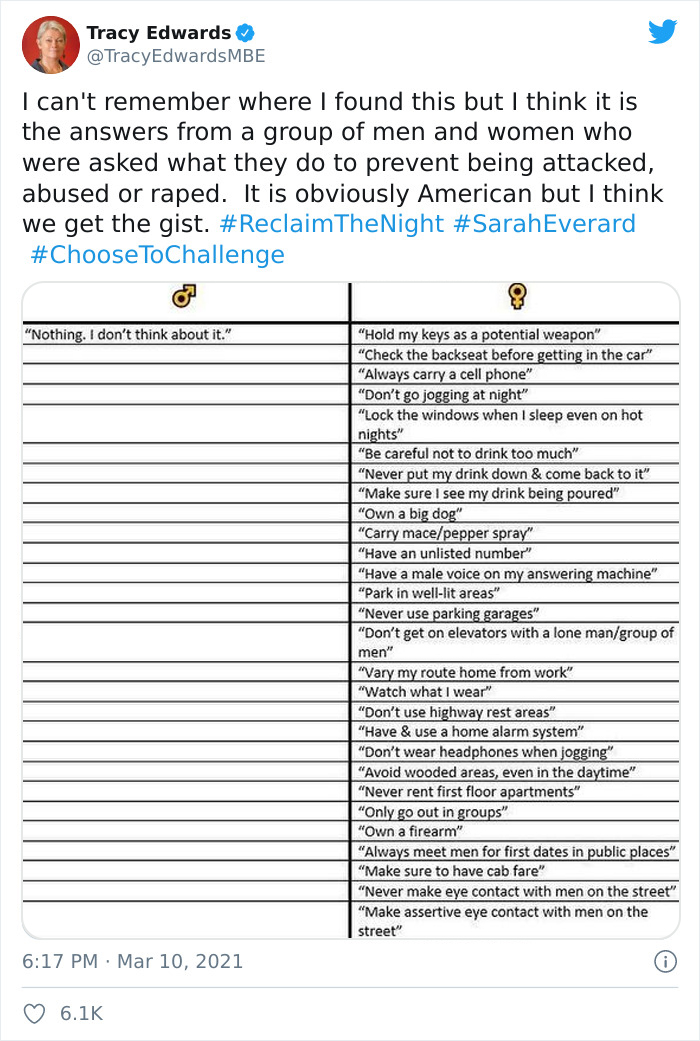
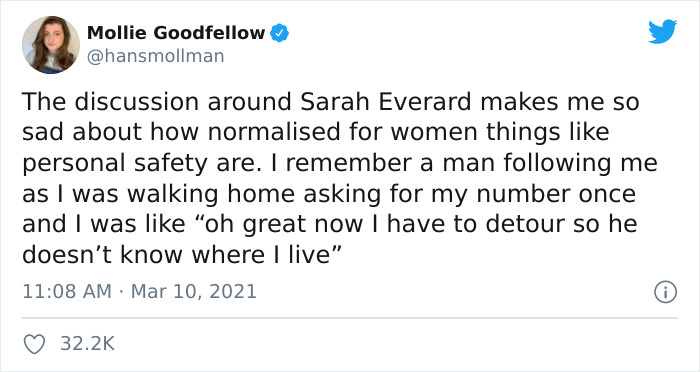
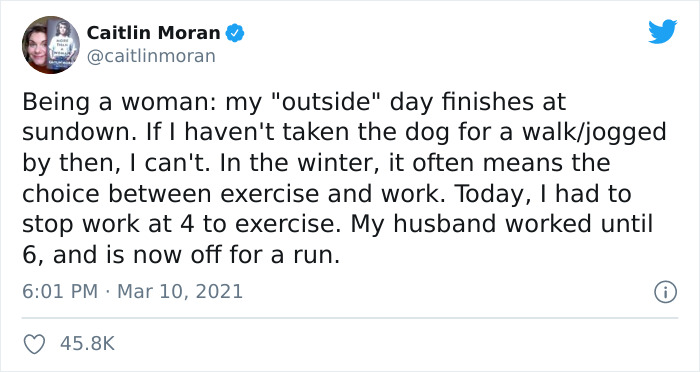
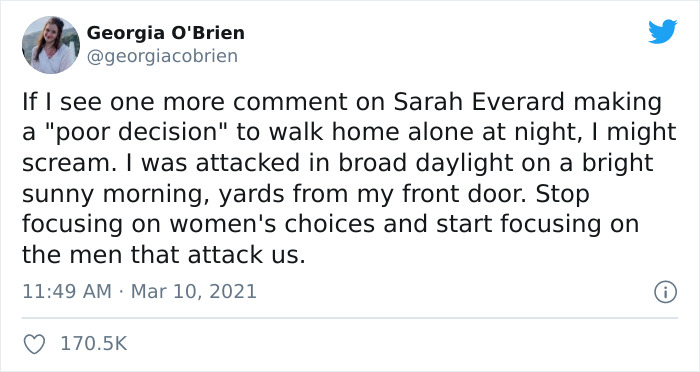
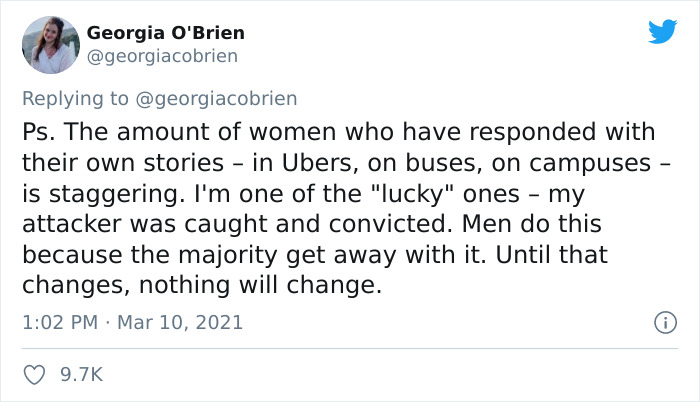
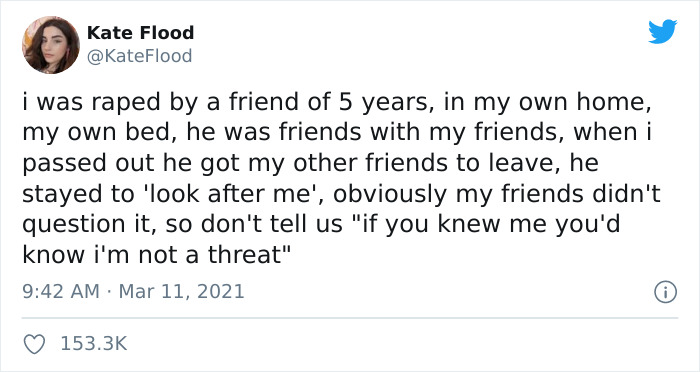
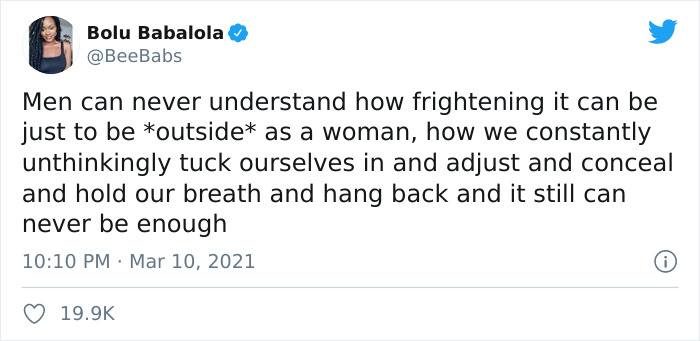
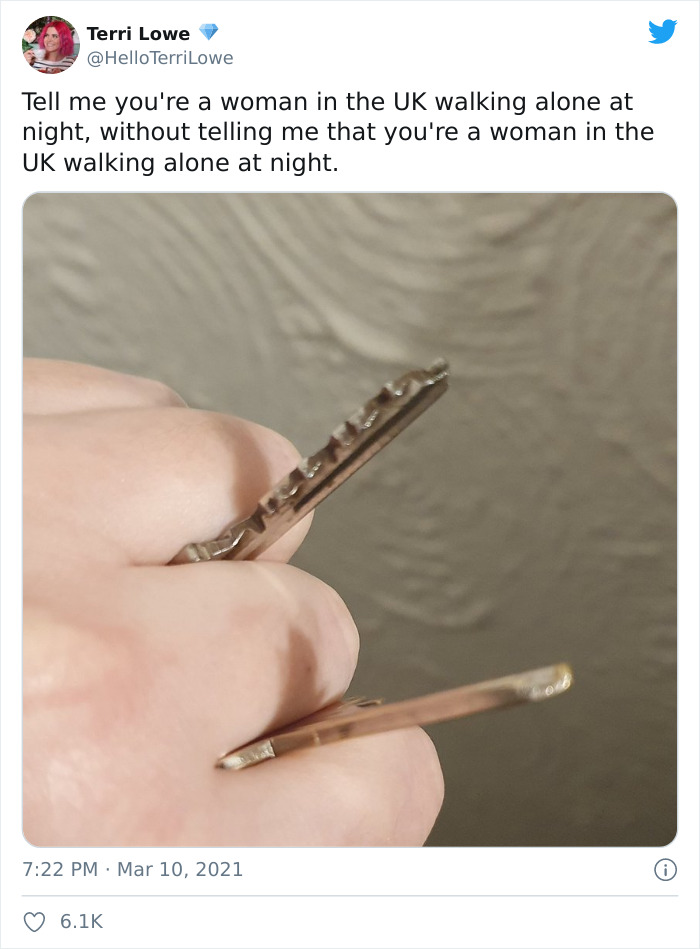
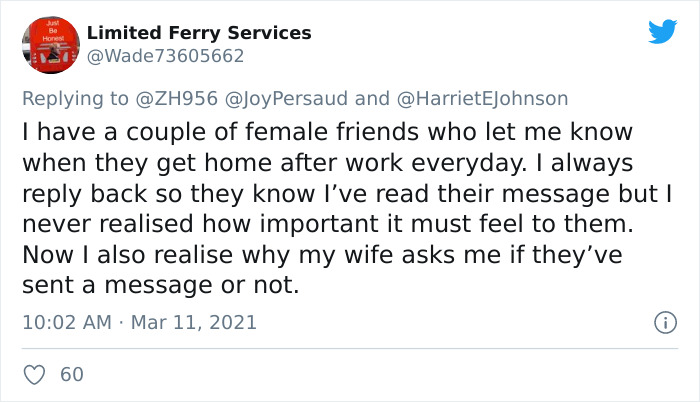
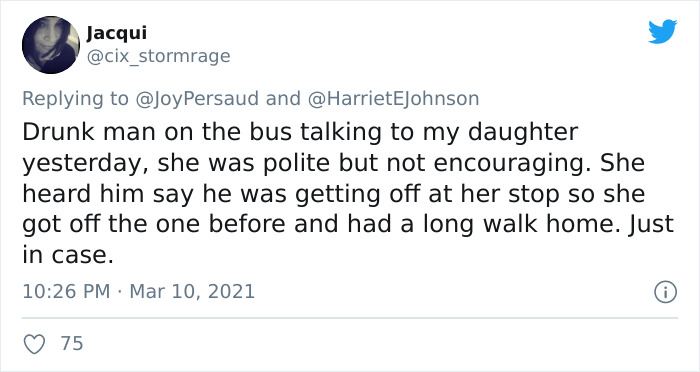
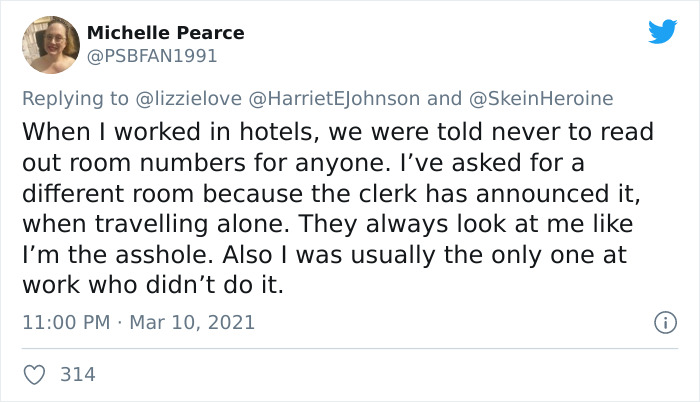
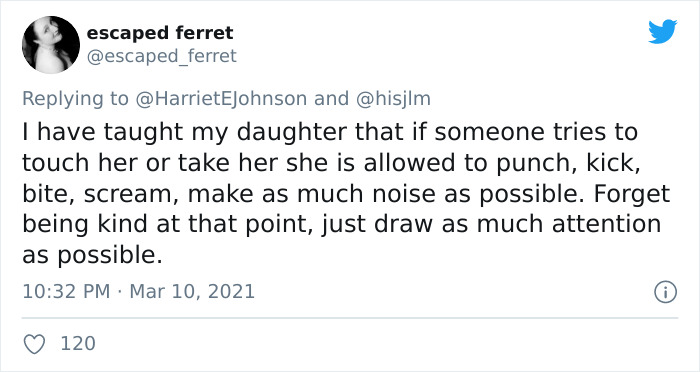
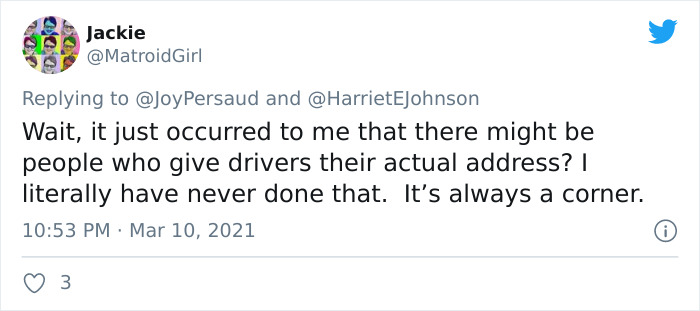
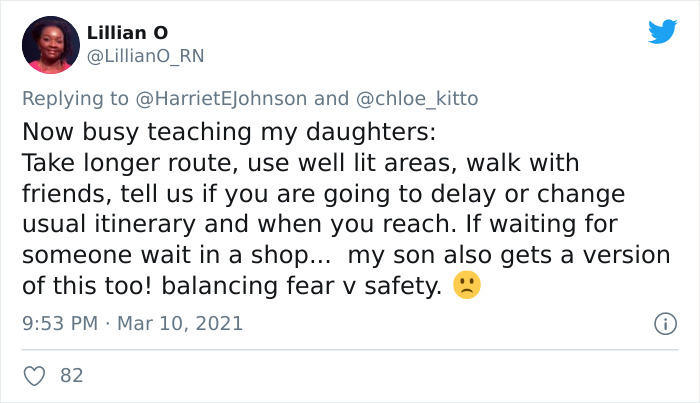
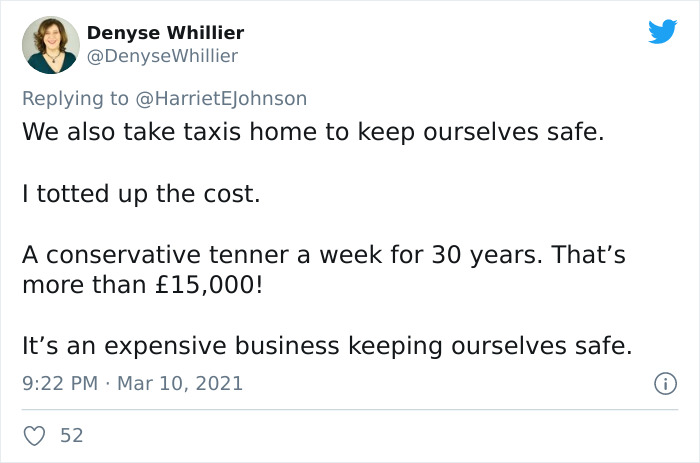
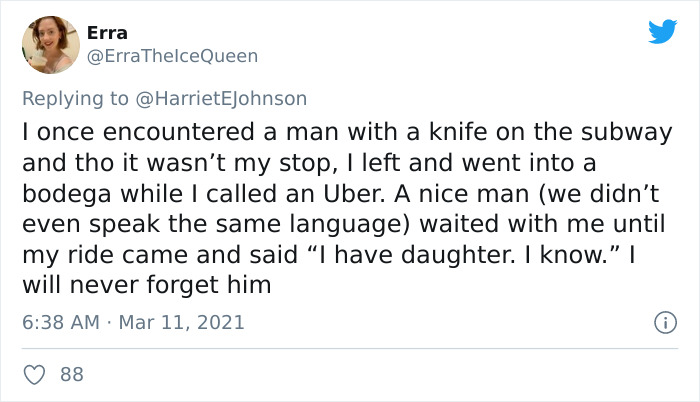
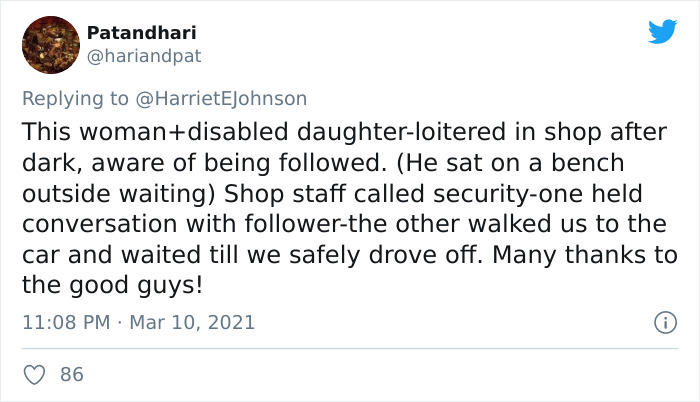
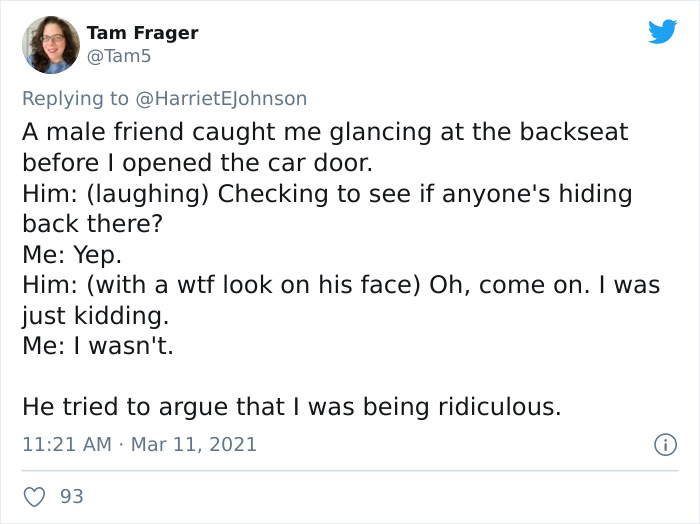
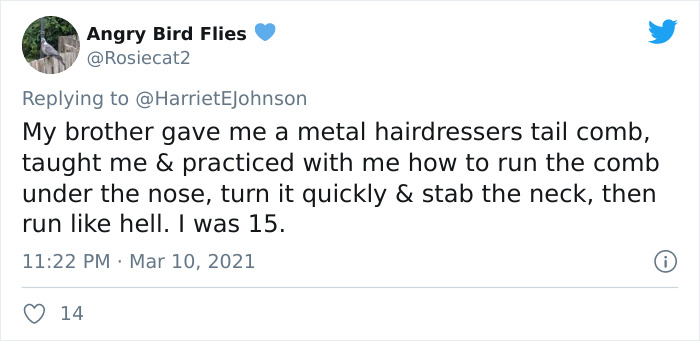
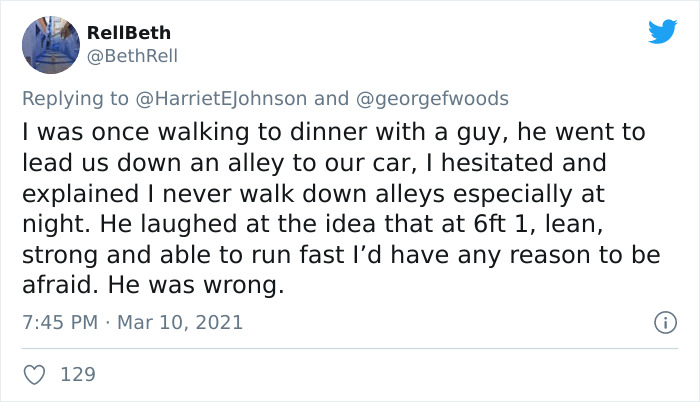













































350
302